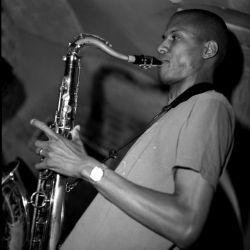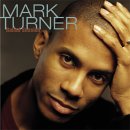

Courtesy of
Mark Turner
© Dimitri Ianni
A
FIRESIDE CHAT WITH MARK TURNER
Mark Turner is a lone reed. He reminds me in more ways than one of John
Coltrane (read the interview and you will agree, if not there is always
the feedback section to your left). His reticence is remarkable in this
day and age of "I want all the ball or throw me the damn ball." So it
is my pleasure to bring to all the ladies in the house the next dreamboat
in jazz, unedited and in his own words.
FRED JUNG: Let's start from the beginning.
MARK TURNER: Well, my parents were music lovers. They had a pretty good
jazz collection. That was my first introduction. I pretty much, I guess
like a lot of people, got involved in elementary school playing clarinet
and in high school playing saxophone, alto and tenor. When I was in high
school, I took some private lessons with a saxophone teacher. That is
pretty much what got me started.
FJ: Influences?
MARK TURNER: In the very beginning, way back in high school, the first
records that I had of saxophone players were of John Coltrane and Sonny
Stitt and Gene Ammons' records, you know, those records that they did
together. Sonny Rollins, I had The Bridge. My parents had The Bridge.
There was also this Dizzy Gillespie record. I forgot the name of it, but
the one with Sonny Stitt and Sonny Rollins on it.
FJ: Sonny Side Up.
MARK TURNER: Exactly, that one.
FJ: What was it about Coltrane that impressed you?
MARK TURNER: First of all, it was my understanding, whether it is true
or not, that his person as a musician and his ideology about music and
living, which I was really drawn to and then how it expressed itself in
music. That's pretty much the way I feel. I don't play like him anymore,
but his constant perseverance and how you can transfer that to yourself.
Just becoming a selfless musician and playing for more of a lofty purpose
than just being a bad musician and sound great.
FJ: Do any of your peers have that lofty purpose?
MARK TURNER: Well, actually, I would say, out of the people that I know,
I would say that is fairly most of the people out there, really. Most
people I know are just playing because they love music and the rest is
incidental. That's basically most of my peers like Kurt Rosenwinkel, Jorge
Rossy, Brian Blade, Brad Mehldau, Chris Cheek, Josh (Redman). I am sure
John Scofield is like that. I am sure Dave Douglas is.
FJ: Where did you get the bulk of your skills, both as a player and as
a leader, through lessons or through sheer experience?
MARK TURNER: It was definitely both. I definitely needed experience and
I definitely needed lessons, lessons/school, in other words information.
You need some kind of guidance. So it is definitely both that helped me
develop, specifically, some of my teachers at Berklee and definitely my
peers, my three saxophone teachers that I had at Berklee and actually,
my band director in high school, my one classical saxophone teacher when
I was at Long Beach State. I was actually an art major/saxophone student.
FJ: So you are familiar with So Cal.
MARK TURNER: Yeah, I'm from Los Angeles, actually. You are in Orange County
right?
FJ: Right.
MARK TURNER: Well, I grew up in Cerritos and then Palos Verdes.
FJ: It must have been quite a stretch to go from So Cal, where it rains
four days out of the year to the snow and winter of the Northeast?
MARK TURNER: Yeah, exactly. It was certainly a change. I love it though.
FJ: Let's touch on your second release for Warner Bros., In This World,
a much better indicator than the self-titled debut.
MARK TURNER: I feel relatively good about it. I was happy with the way
everyone performed on it. It was like a continuation of what I had done
on my very first record, which was before the Mark Turner record, which
was a Criss Cross record (Yam Yam). It was another completed version of
that, maybe more successful in some ways. It was a nice progression.
FJ: Why did you choose to follow that with a ballad recording (Ballad
Sessions)?
MARK TURNER: I went into the studio with that in mind. I wasn't exactly
sure how I was going to do it. I just wanted to do slow music. It could
have been my music or it could have all Broadway tunes. It ended up being
this. I picked a cross section of ballads that I liked.
FJ: Who do you think was a skilled balladeer?
MARK TURNER: Bill Evans, Keith Jarrett, Herbie Hancock, actually, McCoy
Tyner too, Trane, a great ballad player, Paul Desmond, Lester Young, Louis
Armstrong, Stan Getz, Wayne (Shorter), a great ballad player and a great
writer of ballads. I guess I listened to a lot of the Bill Evans Trio.
FJ: It's interesting that you listened to piano trios and you are a horn
player.
MARK TURNER: I liked the simplicity of it. It is just three people. Usually
with a saxophone player or a horn player, unless they are playing trio,
there is something about it. There is no, how can I put it, there is no
harmonic middleman. That creates an intimacy and also because they are
playing piano. It can be done on saxophone too. For example, horn players
may re-harmonize or rearrange a standard for example and then play it,
partially because it is hard to do that on the spot, which piano trios
do. Sometimes, they have something that is pre-written, but basically,
they can change the harmony as they're going. That is one thing that is
pretty nice about it.
FJ: Many of your peers have been criticized for rushing their careers
so rapidly that they neglect to develop fully as players and composers,
but you are comfortable with being a sideman. There is honor in being
a sideman.
MARK TURNER: No doubt, no doubt. Definitely.
FJ: And the future?
MARK TURNER: I am writing music for two more records that I would like
to put out at the same time. I mean, that is what I would like to do.
Of course, I don't know what's going to happen, but that is what I want
to do, just all my music. That is why I choose to do other people's music
on this one (Ballad Sessions), because I kind of wanted to do that for
the last time for a while and move on. I want to do two different bands,
one a guitar quartet and the other a quartet with two saxophones, no piano,
no guitar.
FJ: Who will be the guitarist?
MARK TURNER: I always play with Kurt Rosenwinkel. He's a great guy.
FJ: The saxophonist?
MARK TURNER: Myron Walden I plan to use, if he still wants to.
FJ: Does your introspective nature allow you to focus more efficiently
on your music?
MARK TURNER: Yeah, definitely. Of course, and silence and quiet time always
helps for that, at least for me, to center myself, just to figure out
what my priorities are.
FJ: What are your priorities?
MARK TURNER: I guess to become a stronger musician, composer, and all
that. But even more than that, just to be a giving, selfless person. Having
a better understanding of the meaning of living. That is my main goal.
FJ: Like Coltrane, you are a lone reed.
Fred Jung is Editor-In-Chief and is a cameraman on the Letterman show.
Comments? Email
him.
